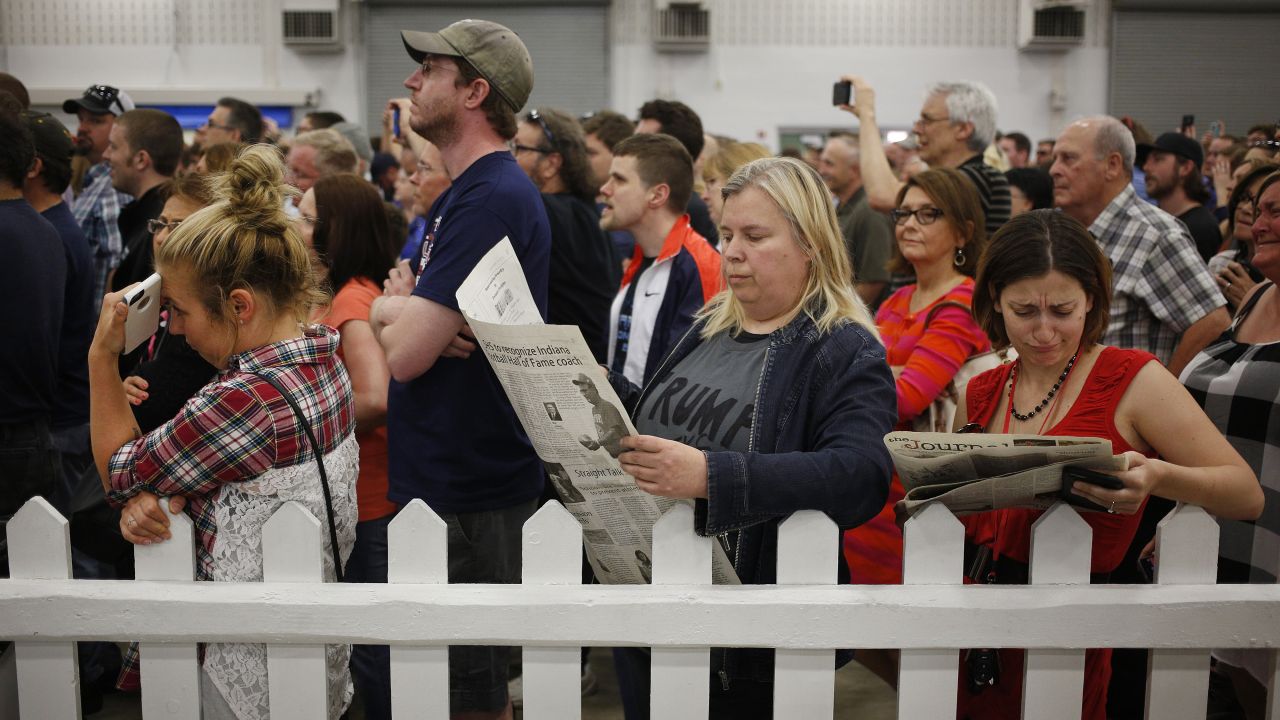
Demonstrators read newspapers in silent protest as Republican presidential candidate Donald Trump (not pictured) speaks during a campaign event in Indianapolis on April 20, 2016. (Photo by Luke Sharrett/Bloomberg via Getty Images)
Warning: This post may shake your faith in journalism.
In the words of the late, great Yogi Berra — or Niels Bohr, or Robert Storm Petersen or Piet Hein or possibly Mark Twain — “Prophecy is difficult, especially about the future.”
Actually, it’s not so hard when the laws of physics come into play. For example, although on June 29, a New York Times headline read, “NASA’s Juno Spacecraft Will Soon Be in Jupiter’s Grip,” by the 4th of July, Jupiter’s grip did its predictable thing and the “soon” retreated into the past.
But not everything in the universe, or in a newspaper’s purview, is physics. There’s also this sort of headline, from The Washington Post: “Could Dwyane Wade really join the Cavaliers — and stick it to the Heat?” When the subject is sports, in keeping with this genre’s general essayistic looseness, its indulgence of writerly license, sloppy prophecy is common coin. It wouldn’t add one iota of journalistic value to run the headline: “Warriors Will Be Hard to Beat in 2016-17,” but sports reporters are permitted, even encouraged, to yack about known unknowns as plain old sports fans do every day in barrooms and taxis, as if to say: We’re all up here in the bleachers together. You aren’t permitted to speculate about box scores or the number of home runs somebody actually hit — millions of sports stats freaks will fry you on Twitter — but you can wax rhetorical all you like. Sports gets special dispensation as an objectivity-free zone. Isn’t sloppy prophecy fun?
And now consider this, from Patrick Healy on page 1 of the July 6 New York Times (italics are mine):
….in just a few minutes of remarks, [FBI director James] Comey called into question Mrs. Clinton’s claims of superiority more memorably, mightily and effectively than Mr. Trump has over the entire past year. And with potentially lasting consequences.
To her charge that he is “reckless,” Mr. Trump may now respond by citing Mr. Comey’s rebuke…
To her promises to defend the United States, Mr. Trump may now retort…
And to her reproofs about his temperament and responsibility, Mr. Trump may now point to Mr. Comey’s finding…
The headline on the dead-tree edition reads: “An Attack Ad, Ready-Made.” The online version reads: “FBI’s Critique of Hillary Clinton Is a Ready-Made Attack Ad.” Of course that attack ad does not (yet) exist. But the speculation does.
Here is another Healy line: “Worst of all was the totality of Mr. Comey’s judgment about Mrs. Clinton’s judgment.” This is not prophecy, it’s a value judgment about Clinton’s judgment; or about how bad the Trump camp thinks it is; or perhaps simply a restatement, in slightly different words, of the prophecies that have just preceded it. But at the very least, it’s not an equivocal prophecy. I’m not saying this judgment is wrong. I’m saying we’ve moved into an era when reporters are unapologetic about making judgments.
One way or the other, what we have here is an example of the new informality that has entered into mainstream reporting. Pundits judge and predict. Reporters judge and predict. Experts judge and predict. This is all the new normal. Perhaps in late recognition that the journalistic era of the ex cathedra proclamation is over — or at any rate severely shaken — the major papers have evacuated the objectivity throne and torn it to pieces. For better and worse, there is no longer a newspaper of record.
That I, or you, reader, may find Healy’s prophecies plausible is neither here nor there. We may well consider them no-brainers. But it’s worth dwelling for a moment on what they signify about the new journalistic voice.
There’s much gained when the reporter steps out in front of the cardboard life-size objectivity dummy. One healthy sign of the new order is the now routine use of the first-person singular in a news report. No longer does a character in a story “tell a reporter.” The reporter steps forward with “I.” Twenty-five years ago, when Times correspondent Barbara Crossette accompanied Indian prime minister Rajiv Gandhi to a rally near Madras, the newspaper ran, next to the “hard news” of his assassination moments later, a piece in which Crossette began as “this correspondent” but a few paragraphs later emerged as “I.” I thought at the time that she, and the paper, had broken new ground.
Nowadays, the “I” is out of the shadows for good. Take this strong Anne Barnard piece filed from Paris, for example, from the same edition in which Healy reads the future (italics are mine):
In Paris, a rainbow flag hangs on the Hotel de Ville, memorializing the 49 people gunned down at a gay nightclub in Orlando last month. But in a corner shop on Monday, the woman who served me had no such sympathy for the Middle East.
When she asked where I lived, and I told her Beirut, Lebanon, she exclaimed about the violence in the region. Struggling to explain that there is a lot more than just violence happening there, I said: “Yes, there are a lot of problems. What can one do?”
“Exterminer les islamistes,” she said grimly.
This great quote is made all the greater because the woman — who may or may not be aware she is the reincarnation of Joseph Conrad’s character Kurtz in Heart of Darkness — spoke to a named person, the superb reporter Anne Barnard, not to “a reporter.”
Note: I’m not insisting on making a point about false equivalency. That point too could readily be made. For example, Healy refers to Clinton’s email ventures as constituting “one of the most irresponsible moves in the modern history of the State Department.” The reader is left free to wonder what the other high-ranking irresponsible moves might be. Might they include, for example, Secretary Colin Powell telling the UN Security Council in 2003 that the administration of George W. Bush had “irrefutable and undeniable” proof that “Saddam Hussein is determined to keep his weapons of mass destruction; he’s determined to make more”? Does the modern history of the State Department include the countless falsehoods uttered by Secretary Dean Rusk about Vietnam?
Let readers judge whether The Washington Post’s fact-checkers are justified to slap four Pinocchios onto Secretary Clinton on the strength of the FBI report. Or whether the headline-writer for Chris Cillizza’s July 6 piece was justified to write: “Hillary Clinton’s email problems might be even worse than we thought.” Cillizza’s piece is tough, as we’ve come to expect. (Consider this recent headline: “Donald Trump’s Brexit press conference was beyond bizarre” — a judgment with which, for the record, I heartily concur.)
But on July 6, Cillizza’s last line reads (again, italics are mine):
..all things considered, this is a very bad day for the Clinton campaign. It’s not the worst outcome (indictment), but it badly disrupts her attempts to move beyond the email server story as she seeks to unite the party in advance of the Democratic convention later this month. And it suggests the email issue will haunt her all the way through Election Day on Nov. 8.
It “suggests”? Does a Post reader really need to be told what might haunt her for the next four months? Can’t we be left alone to sit on the edges of our own seats?
[Note: Thanks to Elinor Langer for suggesting this subject. All publication dates above are from dead-tree editions.]




